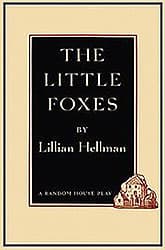The Little Foxes
Critique • Quotes • At the movies
 First edition
First editionFirst performed
1939, New York City
Literary form
Play
Genres
Drama
Writing language
English
Author's country
United States
Length
Three acts, approx. 21,500 words
Politically sharp, dramatically sharper
What may be most surprising about Lillian Hellman's play The Little Foxes is it's such an absorbing piece of drama despite being about a business deal.
The Hubbard siblings—brothers Oscar and Ben and sister Regina—fight over who's to get the biggest share of the company they've formed with a northern investor to run cotton mills in their southern U.S. state. Their cutthroat tactics, the verbal cat-and-mouse games they play, take up a large part of the dialogue. As any commentary will tell you, Little Foxes is a play about greed.
A more political way of putting it is that the play presents in microcosm the American dog-eat-dog, free-enterprise system of profit before all else.
It's the survival of the strongest, the Hubbards representing the bourgeoisie who have seized power from the dying feudal class (represented here by Oscar's pathetic wife Birdie, whose aristocratic family once owned the cotton fields the Hubbards are now exploiting) and who are now fighting over the spoils. Meanwhile, the majority of folks, loosely represented by the servants and the unseen townsfolk, suffer the consequences.
And the play does indeed show all those things. Problem is, though, the characters are never quite the monsters such a polemic would demand.
No demons
Oscar is an ineffectual fool who rides his brother's coattails, until he makes the one bold gesture of his life, involving his equally useless son Leo in his crime. Ben is a jovial villain, good-humouredly accepting both triumph and adversity as they come his way. Regina is the most mesmerizing character, fighting for her stake in a man's world, wanting the best for her daughter Alexandra, but capable of cold-hearted murder when it's required.
A strength of the play is that no one is demonized—no one is shown to act out of pure malice, but with all their various personalities they act out of necessity to fulfill their economic destinies.
Alexandra however is rather a non-entity. Perhaps standing in for the author, she's an idealist who is appalled by what she sees in her family, goaded to turn against it by her black maid Addie and her dying father, a small-town banker. However, er full conversion is unbelievable, given that she grew up in luxury and had not previously shown much intelligence or insight. Her little speech at the end about how she will fight against the take-over of the country by people like her relatives seems to be tacked on as a sort of parallel to Tom Joad's moving speech near the end of The Grapes of Wrath.
Addie also appears wise beyond credibility, coming up with such insights as "There are people who eat earth and eat all the people on it like in the Bible with the locusts. And other people who stand around and watch them eat."
Slightly dated
Apart from these two though, the characters do draw us into their intrigues. We find ourselves rooting for each of them against the other.
Maybe Hellman intended this, as an allegory to how the media and culture trap us into siding with various alliances within the ruling class. Or is this too much a later-1900s/early-2000s notion?
There is a slight dated quality to The Little Foxes. In the era of multinationals, the idea of a single rich family pulling the economic strings seems a trifle naive. The great fortunes of our day are not made by individuals in drawing rooms or southern parlours.
But the play does get at something about people in our society, about where we've come from, that is more universal. The psychology still holds. Many of the lines still ring true.
And the drama still enthralls, which is why this play continues to be produced by amateur and professional theatres around the world. And why it's still worth reading.
— Eric
Critique • Quotes • At the movies

